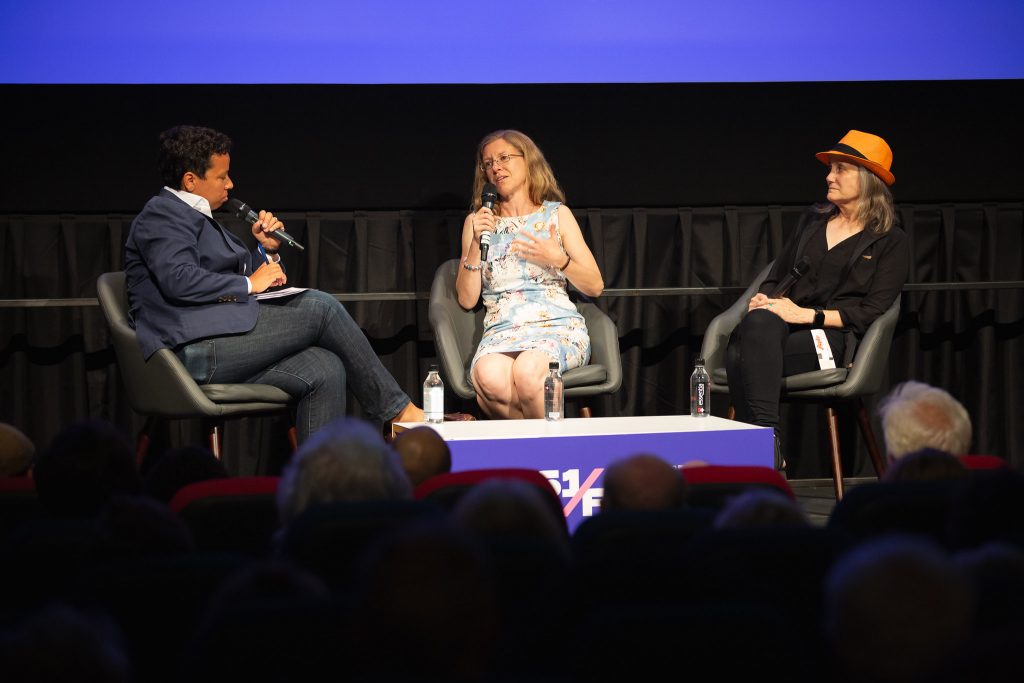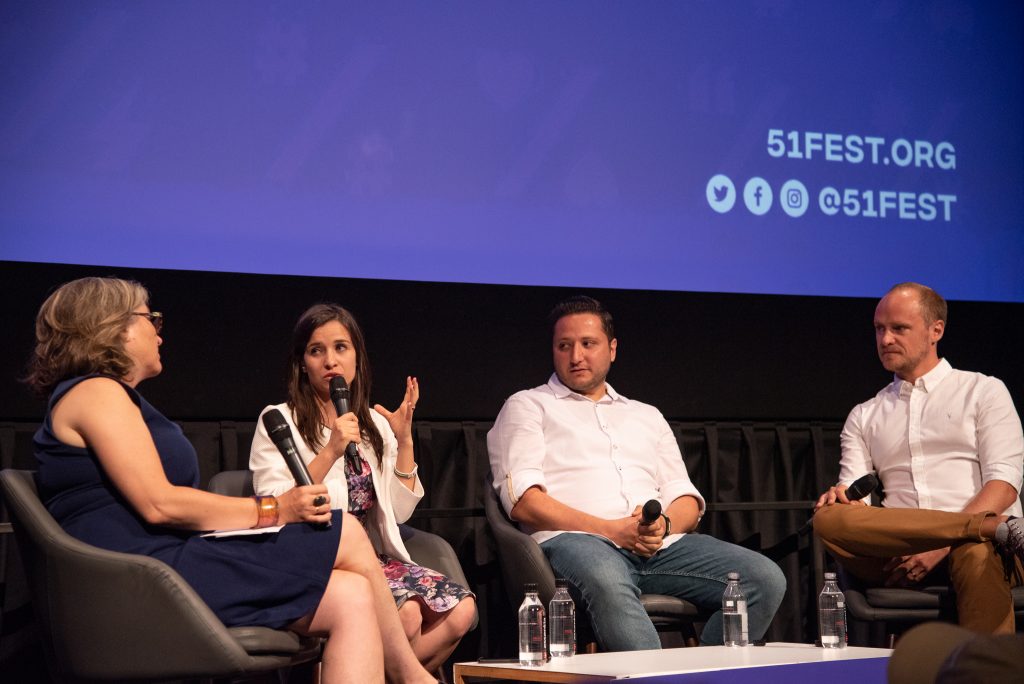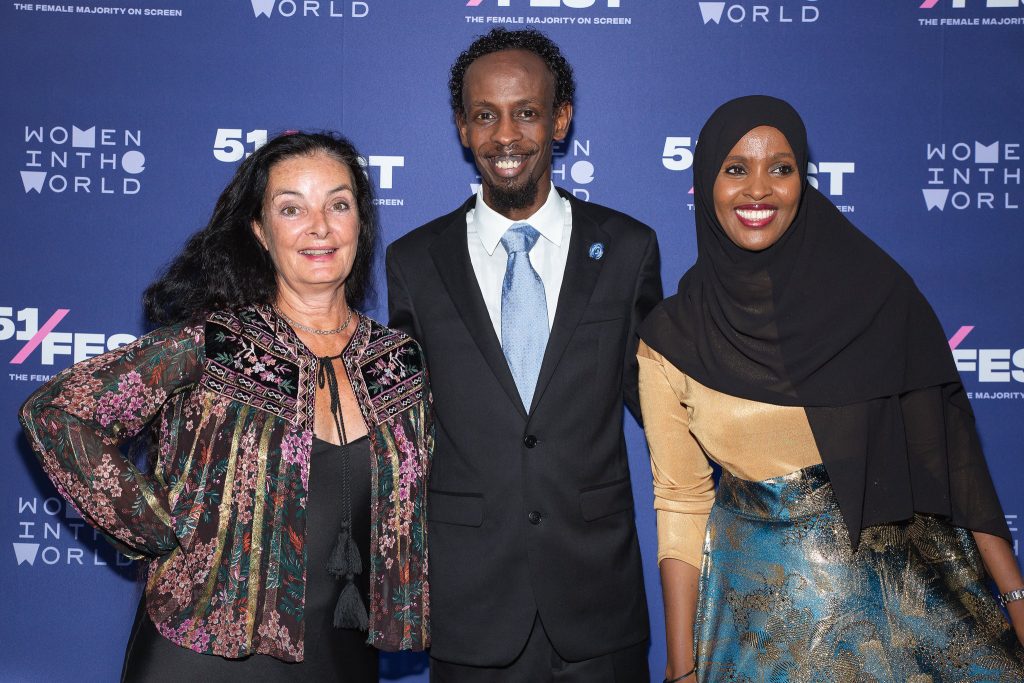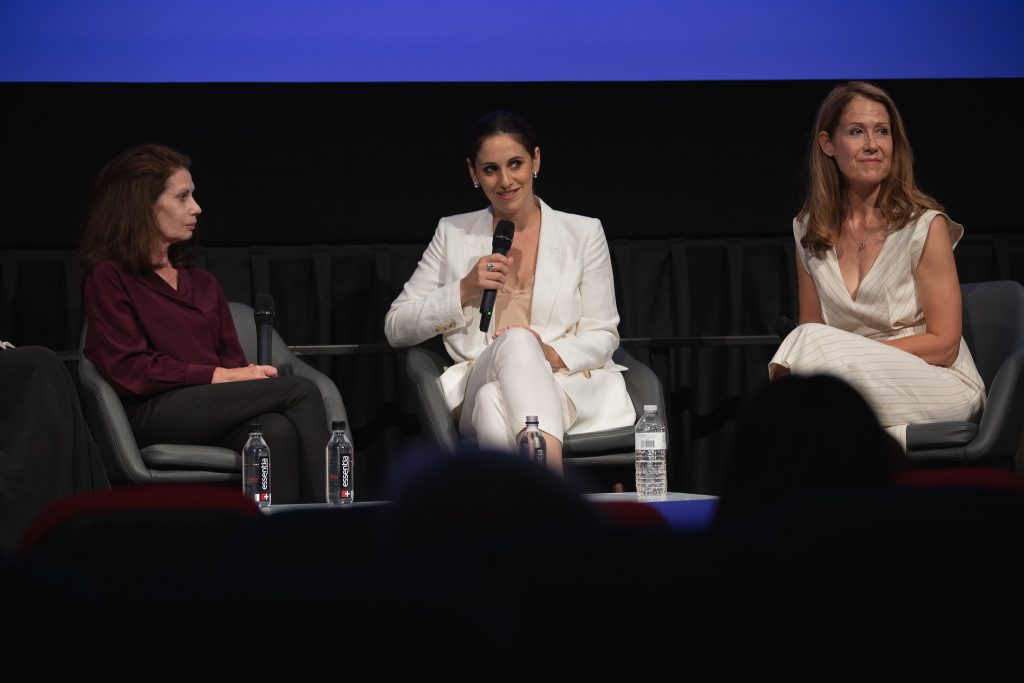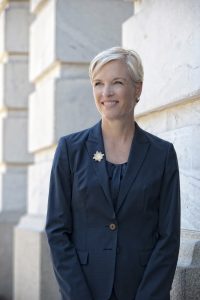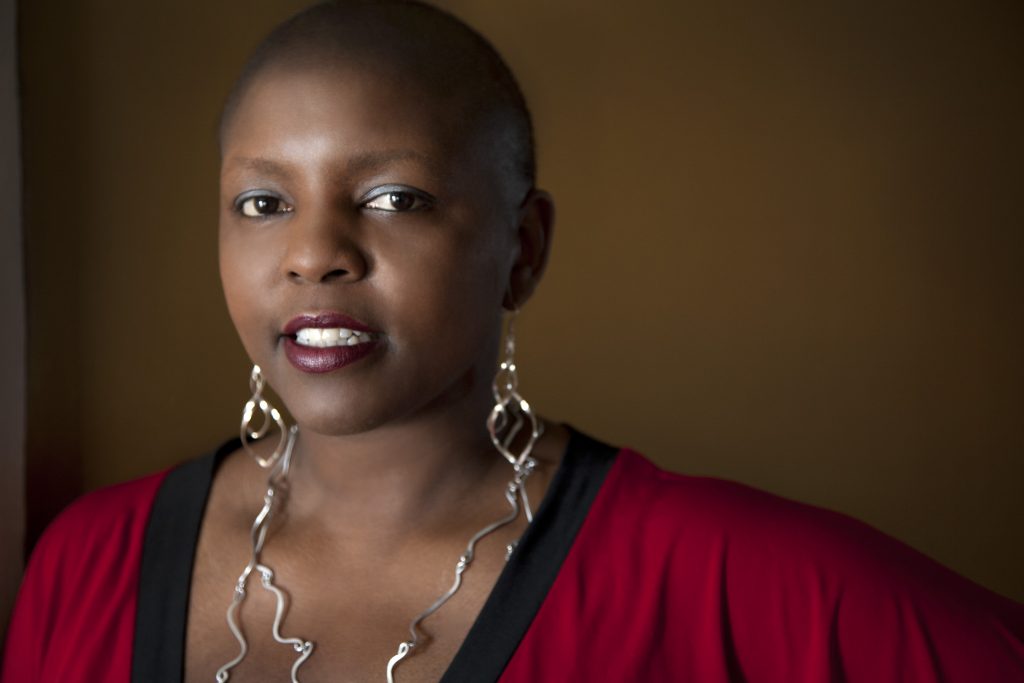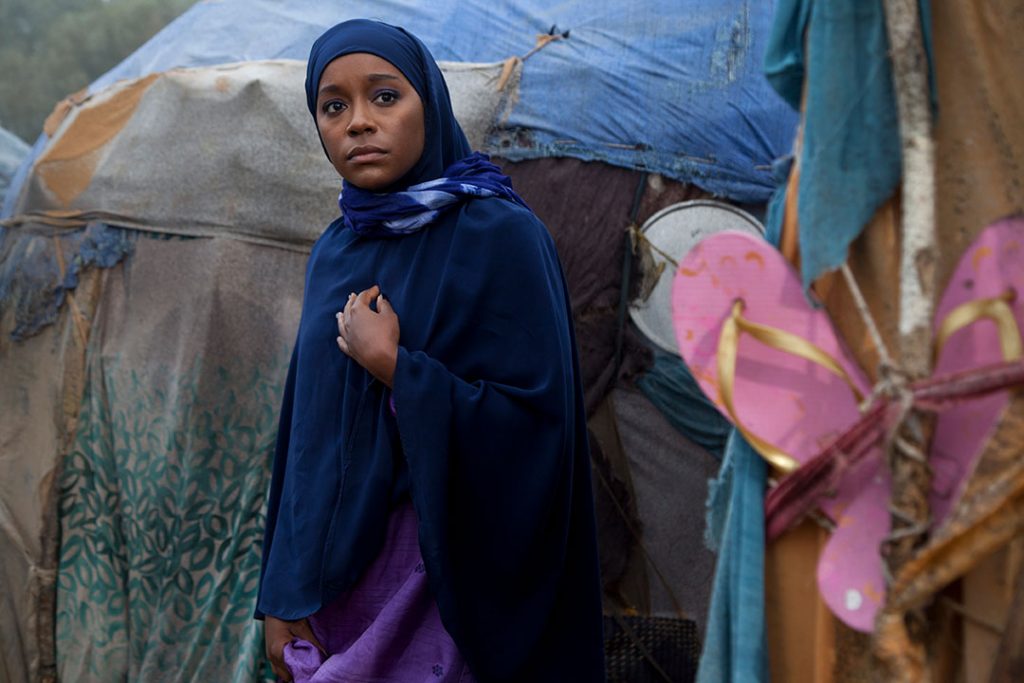July 22, 2019
by Carla Hay

The inaugural 51Fest, a New York City film festival aimed at promoting movies about women, was an inspiring experience and a resounding success: All of the offerings (which took place at IFC Center, except for one screening at the SVA Theatre) sold out, and several stars attended the event, which took place from July 18 to July 21, 2019. The festival, which is presented by feminist organization Women in the World and the independent arthouse cineplex IFC Center gets its name from the fact that women make up 51 percent of the U.S. population and at least half of all moviegoers. All of the selected projects for 51Fest have at least one female producer or a female director. Each screening had a post-screening Q&A with someone involved in the film, whether it was a star of the movie, a director, a writer and/or producer.
Most of the movies in the first 51Fest lineup already had their world premieres at the Sundance Film Festival or South by Southwest (SXSW) Film Festival, but there are a few offerings that had their world premieres at 51Fest: The first episode of the Netflix limited series “Unbelieable,” a drama starring Toni Collette, Merritt Wever and Kaitlyn Dever, as well as the Netflix comedy film “Otherhood,” starring Angela Bassett, Patricia Arquette and Felicity Huffman.

The opening-night film was “Kathy Griffin: A Hell of a Story,” a documentary chronicling controversial comedian Kathy Griffin’s comeback tour after being blackballed from most of the entertainment industry in 2017 because she posed for a photo holding a fake, bloody head of Donald Trump. “Kathy Griffin: A Hell of a Story” got mostly positive reviews after its world premiere at the SXSW Film Festival. Griffin did a post-screening Q&A with Women in the World founder Tina Brown.
On July, 19, there was a panel called “Women in the World Spotlight: Supermajority,” also moderated by Brown. The panel featured former Planned Parenthood president Cecile Richards and Ai-jen Poo, the co-founders (along with Alicia Garza) of Supermajority, an activist organization aimed at empowering women. Also on the panel was Civitas Public Affairs Group partner Katherine Grainger. At the panel discussion, filmmaker Yoruba Richen previewed an exclusive clip of the forthcoming documentary “And She Could Be Next,” about a movement of women of color claiming political power.
According to a 51Fest press release: “The conversation highlighted the new organization and centered on the panelists’ personal stories of activism, their plan to shape a ‘New Deal’ for women and elevate women’s stories to where they belong — the center of the stage, the debate and the forefront of change.”

Oscar-winning actress Julianne Moore did a Q&A with moderator Brown after the New York premiere of her dramatic film “After the Wedding.” (Click here to read the entire interview.) “After the Wedding” (a remake of the 2006 Danish film directed by Susanne Bier) is an emotionally riveting movie about three people (played by Moore, Michelle Williams and Billy Crudup) and how they are connected to a family’s secrets and lies that get exposed in the story. The movie is set for release in select U.S. theaters on August 9, 2019.
Several of the movies had their New York premieres at 51Fest and are based on true stories. They include the dramedy “Brittany Runs a Marathon,” starring Jillian Bell as a woman who enters the New York Marathon to improve her health; the drama “A Girl From Mogadishu” (starring Aja Naomi King), which tackles the difficult subject of female genital mutilation; and “Official Secrets,” starring Keira Knightley as British whistleblower Katharine Gun, who exposed U.S. political corruption behind the war in Iraq. All three of the real-life women who inspired these respective movies (Brittany O’Neill, Ifrah Ahmed and Gun) did Q&As after each respective screening.
Besides the Griffin documentary, other non-fiction films at 51Fest were the award-winning documentary “For Sama,” set in war-torn Syria; “Raise Hell: The Life and Times of Molly Ivins” about the late columnist/outspoken political commentator Molly Ivins; and “Untouchable,” an examination of the rise and fall of disgraced entertainment mogul Harvey Weinstein and the female accusers who say that Weinstein sexually harassed or sexually abused them.
As for the two world premieres at 51Fest (“Unbelievable” and “Otherhood”), they’re both from Netflix, but these two projects couldn’t be more different.
The Netflix limited series “Unbelievable” is a taught, well-acted thriller, based on the first episode that screened at 51Fest. In the series, which is inspired by a true story, Kaitlyn Dever plays Marie Adler, a troubled teenager in Lynnwood, Washington. Marie has spent a great deal of her life in foster homes and is now old enough to live on her own. In the beginning of the episode, Marie files a police report, claiming a masked intruder raped her in her home, where she lives alone.
The problem is that Marie keeps changing her story, by saying that she could have imagined the rape, and then changing her mind again. She also changed several details of what happened, leading to further confusion. The investigating police become increasingly frustrated with her, and even Marie’s closest confidants begin to wonder that the truth is.

A good deal of the series is also about detectives Grace Rasmussen and Karen Duvall (played Toni Collette and Merritt Wever), who are hundreds of miles away, and are investigating a case that is similar to what Marie has reported. The first episode of “Unbelievable” focuses primarily on introducing Marie’s storyline, but a teaser for the season shows that Emmy winners Collette and Wever give compelling performances. Dever does an outstanding job of portraying the complex character of Marie.
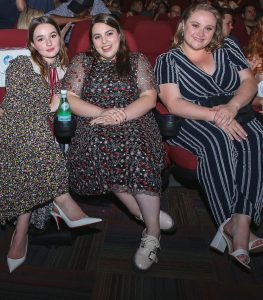
After the premiere of the first “Unbelievable” episode, there was a Q&A with showrunner and executive producer Susannah Grant, executive producer Sarah Timberman, executive producer and episode director Lisa Cholodenko, and cast members Dever, Wever and Danielle Macdonald, who plays another rape victim in the story. (In the audience was Beanie Feldstein, Dever’s best friend and co-star in the 2019 comedy “Booksmart.”) During the Q&A, Dever said that she didn’t consult with the real Marie because “I wanted to respect her privacy.” Dever added that in her portrayal of Marie, she didn’t want to do a “carbon copy” of her, but wanted to do an interpretation of what Marie was like.
“Unbelievable” is inspired by the real events in The Marshall Project and ProPublica Pulitzer Prize-winning article, “An Unbelievable Story of Rape,” written by T. Christian Miller and Ken Armstrong, and the “This American Life” radio episode “Anatomy of Doubt.” Netflix will premiere “Unbelievable” on September 13, 2019.
The comedy film “Otherhood” is the feature-film directorial debut of writer/director Cindy Chupak, who’s best known for being part of the “Sex and the City” team. The story is about three longtime friends—Carol Walker (played Angela Bassett), Gillian Lieberman (played by Patricia Arquette) and Helen Halston (played Felicity Huffman)—who spontaneously take a road trip together from their homes in suburban Poughkeepsie to New York City, in order to reconnect with their adult sons, who have a habit of ignoring their mothers. The sons, who are in their 30s, have become so emotionally distant from their mothers that they don’t return calls, email or texts, and they even forget to contact their mothers on Mother’s Day, which is a snub that triggers the road trip.
The catch is that the mothers haven’t told their sons in advance that they’re coming to visit—and the plan is to stay at their bachelor sons’ homes for a few days—so the meddling mothers aren’t quite sure what to expect. All three sons appear to be the only children in their respective families, since the mothers don’t mention any other siblings for their children. The movie gets its title because the mothers’ alienation from their sons doesn’t feel like motherhood to them. It feels like “otherhood.” As Gillian says, a mother being ignored by a child is like “inhumane emotional waterboarding.”

All three of the mothers (who met through their sons when their sons were kids) are clingy and neurotic, in different ways. Carol, a widow who lives alone, is the biggest worrywart of the group. Carol’s son Matthew (played by Sinqua Walls), an art director at an upcoming magazine that’s similar to Maxim, has a tendency to date barely legal women, and he lives in a trendy loft in Manhattan.
Gillian is a hippie-ish, earth-mother type who has a loving and supportive husband, and she’s the type of mother who will clean her son’s apartment and make comfort-food meals without him even asking her. Gillian’s son Daniel (played by Jake Hoffman), a struggling writer who lives in a dumpy apartment in the working-class Long Island City neighborhood, has recently gone through a messy breakup with a woman he had hoped to marry.
Helen, who’s been divorced and is on her second marriage, is uptight, critical, and hates the idea of aging and becoming a grandmother. Helen’s openly gay son Paul (played by Jake Lacy) is a window dresser and is in a relationship with a guy that’s somewhere in between “friends with benefits” and “serious romance.” Paul lives in an upscale town home in Manhattan and comes from a privileged background.

Carol and Gillian are desperate for their sons to find a nice woman to settle down with and marry. The two mothers try to play matchmaker with their sons, which (not surprisingly) doesn’t go over too well. Gillian, who converted to Judaism when she married Daniel’s father, is the most aggressive about her matchmaking, and makes it clear that she prefers that Daniel choose a wife who is also Jewish. Gillian sets up a reluctant Daniel on a blind date, which is one of the funniest scenes in the movie. Carol invites herself to a work-related party that Matthew’s company is having at a hip nightclub. She gets drunk, and she zeroes in on a potential girlfriend for Matthew who’s close to his age, even though she knows that he might not be interested because he prefers to date much-younger women.
Meanwhile, pill-popping, booze-swilling Helen (who is by far the least likeable character in this story) still has lingering resentment that Paul never officially came out as gay to her (she figured it out on her own), and she hates that Paul told his father (Helen’s ex-husband) instead. It’s easy to see why Paul doesn’t like communicating with Helen, because she likes to pick fights over imagined insults, and she’s constantly accusing Paul of the emotional sabotage that Helen herself is inflicting. Paul spends quite a bit of time having to make apologies to Helen. He’s a lot more patient with her than other people would be.

If you’ve seen enough comedy films (especially the ones on Netflix), you can easily predict how this story is going to go. At a post-screening Q&A with Chupack and producers Cathy Schulman and Jason Michael Berman (the Q&A was moderated by “Sex and the City” alum Mario Cantone, who has a small role in “Otherhood” as one of Paul’s acquaintances), Chupak said it took about 20 years for “Otherhood” to get made because it’s the kind of movie that most movie studios don’t want to make anymore. She added that Netflix and other streaming services are a boon for creators who want their projects to get made.
Even though “Otherhood” is set in the present day (and has lots of references to social media), there’s still kind of an outdated tone to much of the screenplay, because the mothers in the movie are so old-fashioned in how they’re desperate to get approval from the men in their lives. Showing up unannounced at an adult child’s home and expecting to stay over for a few days—it’s all just so rude and cringeworthy, that it kind of leaves a bad taste in your mouth because it’s not cute at all. (Although, to be fair, two of the mothers initially can’t go through with ambushing their sons to crash in their homes as uninvited guests, so these two mothers check into a hotel at first.)
The loyal friendship between the three women is admirable, and it’s great to see what seems to be natural chemistry between the three lead actresses, who all do a fine job with the mediocre screenplay that they’ve been given. A better movie would have had the three mothers focusing less on trying to manipulate their sons’ love lives and more on the mothers trying to genuinely reconnect with their sons by trying to understand what makes them happy in their current lives. This is such a “made for Netflix” comedy movie, right down to the sitcom-ish musical score. “Otherhood” isn’t going to be nominated for any awards, but there are worse ways to spend 100 minutes of your time. Netflix will premiere “Otherhood” on August 2, 2019.
Here are some other photos from the inaugural 51Fest:


